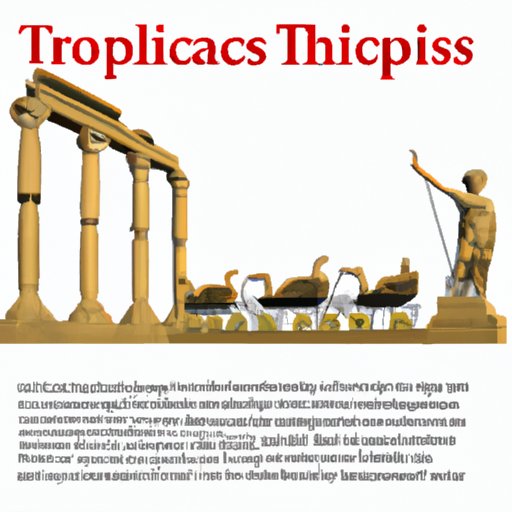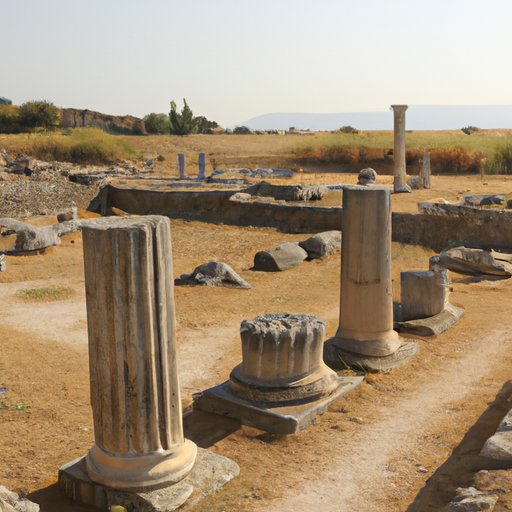Introduction
Hellenistic culture is a term used to describe the culture that developed in the Mediterranean world following the death of Alexander the Great in 323 BCE. It was a fusion of Greek, Persian, Egyptian, and Indian cultures and was characterized by its cosmopolitan nature, artistic and architectural innovations, philosophical thought, and scientific advances. This article will explore the various ways in which this culture spread throughout the Mediterranean world and beyond in the Hellenistic period.
Examining the Expansion of Alexander the Great’s Empire
Alexander the Great’s reign (336-323 BCE) is often cited as a key factor in the spread of Hellenistic culture. During his reign, Alexander conquered vast amounts of land, from Egypt to India, creating an empire that stretched from Greece to India. This allowed for significant cultural exchange between the various regions, leading to the emergence of a unified Hellenistic culture.
Historical Context of Alexander’s Reign
The historical context of Alexander’s reign is important to consider when examining the spread of Hellenistic culture. At the time of his death, Alexander had created one of the largest empires in history. This meant that he had control of numerous different cultures, languages, and religions, all of which were exposed to each other through the creation of his empire. This allowed for a significant amount of cultural exchange and diffusion, leading to the development of a unified Hellenistic culture.
Impact of Conquests on Cultural Exchange
Alexander’s conquests also had an impact on the spread of Hellenistic culture. As he conquered new territories, he would often bring with him Greek customs and practices. He also encouraged intermarriage between Greeks and locals, which further facilitated the spread of Hellenistic culture. Additionally, he established colonies in many of the regions he conquered, which provided a base for the diffusion of Hellenistic culture.

Analyzing the Role of Trade in Spreading Hellenistic Culture
Trade routes also played a major role in the spread of Hellenistic culture. The growth of trading networks during the Hellenistic period allowed for the transfer of goods, ideas, and people. This allowed for a more rapid spread of Hellenistic culture throughout the Mediterranean world.
Influence of Greek Colonization on Local Cultures
The establishment of Greek colonies throughout the Mediterranean world also had an impact on the spread of Hellenistic culture. Greek colonists often brought with them their own language, customs, and beliefs, which were then adopted by the local populations. This allowed for a more rapid diffusion of Hellenistic culture, as the colonists were able to spread their culture to the local populations.
Exploring the Role of Commercial Exchange and Trade Routes
In addition to Greek colonization, commercial exchange and trade routes also played an important role in the spread of Hellenistic culture. The increased flow of goods, ideas, and people across the Mediterranean world facilitated the diffusion of Hellenistic culture. Merchants and traders served as a conduit for the spread of Hellenistic culture, as they were able to transport goods and ideas from one region to another.

Investigating the Role of Religious Syncretism in Diffusion of Hellenistic Culture
Religious syncretism was also a factor in the spread of Hellenistic culture. During the Hellenistic period, the various polytheistic religions of the Mediterranean world began to merge into a single religion, known as Hellenistic religion. This allowed for the diffusion of Hellenistic culture, as the various religions were able to adopt elements of each other’s beliefs and rituals.
Unification of Polytheistic Religions Under Hellenistic Culture
The unification of the various polytheistic religions under Hellenistic culture allowed for the diffusion of Hellenistic culture. This was achieved through the adoption of common beliefs and rituals, which allowed for the integration of different religious practices. This allowed for the spread of Hellenistic culture to different regions, as the various religions became more unified.
Adoption of New Belief Systems and Rituals
The adoption of new belief systems and rituals also played a role in the spread of Hellenistic culture. As the various religions interacted with each other, they began to adopt elements of each other’s beliefs and rituals. This allowed for a more rapid diffusion of Hellenistic culture, as the various religions were able to learn from each other and incorporate new ideas into their own belief systems.
Studying the Role of Roman Conquest in Spreading Hellenistic Culture
The Roman conquest of the Mediterranean world also had an impact on the spread of Hellenistic culture. The expansion of the Roman Empire led to increased contact between the various cultures of the region, allowing for a more rapid diffusion of Hellenistic culture.
Expansion of Roman Empire
The expansion of the Roman Empire had a major impact on the spread of Hellenistic culture. As the Roman Empire expanded, it brought its own customs and beliefs to the various regions it conquered. This allowed for a more rapid diffusion of Hellenistic culture, as the Romans were able to spread their own culture to the conquered regions.
Interaction Between Roman and Greek Cultures
The interaction between Roman and Greek cultures also had an impact on the spread of Hellenistic culture. As the two cultures interacted, they began to borrow elements from each other, allowing for a more rapid diffusion of Hellenistic culture. For example, the Romans adopted many aspects of Greek art and architecture, which allowed for the spread of Hellenistic culture to different regions.

Investigating the Influence of Greek Language on Other Languages
The influence of the Greek language on other languages also played a role in the spread of Hellenistic culture. The widespread use of Koine Greek, a dialect of Ancient Greek, allowed for the spread of Greek culture to other regions. This allowed for a more rapid diffusion of Hellenistic culture, as the various cultures were able to communicate with each other using a common language.
Spread of Koine Greek
The spread of Koine Greek played a major role in the spread of Hellenistic culture. Koine Greek was the common language used by the various cultures of the Mediterranean world during the Hellenistic period. This allowed for a more rapid diffusion of Hellenistic culture, as the various cultures were able to communicate with each other using a common language.
Development of New Dialects
The development of new dialects also had an impact on the spread of Hellenistic culture. As the various cultures interacted with each other, they began to develop their own dialects of Koine Greek. This allowed for the diffusion of Hellenistic culture to different regions, as the various cultures were able to communicate with each other using a common language.
Conclusion
This article has explored the various ways in which Hellenistic culture spread throughout the Mediterranean world and beyond in the Hellenistic period. It has examined the role of Alexander the Great’s empire, trade routes, religious syncretism, and Roman conquest in the diffusion of Hellenistic culture. It has also explored the influence of the Greek language on other languages. In conclusion, it can be seen that the spread of Hellenistic culture was a complex process, involving numerous factors and actors.
Summary of Findings
In summary, this article has examined the various ways in which Hellenistic culture spread throughout the Mediterranean world and beyond in the Hellenistic period. It has explored the role of Alexander the Great’s empire, trade routes, religious syncretism, and Roman conquest in the diffusion of Hellenistic culture. It has also looked at the influence of the Greek language on other languages. Overall, it can be seen that the spread of Hellenistic culture was a complex process, involving numerous factors and actors.
Implications for Further Study
This article has provided an overview of how Hellenistic culture spread throughout the Mediterranean world and beyond in the Hellenistic period. However, there is still much more to be studied in this area. Further research could focus on the specific mechanisms by which Hellenistic culture was transferred and diffused throughout the ancient world. Additionally, it would be interesting to examine the long-term effects of the spread of Hellenistic culture on the various cultures of the Mediterranean world.
(Note: Is this article not meeting your expectations? Do you have knowledge or insights to share? Unlock new opportunities and expand your reach by joining our authors team. Click Registration to join us and share your expertise with our readers.)
